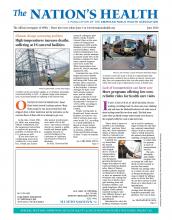
People with Down syndrome are living longer, healthier and more active lives compared to decades ago.
Photo by Halfpoint, courtesy iStockphoto
The U.S. health care system must do better at screening people with intellectual and developmental disabilities for dementia, especially as some members of the population are at higher risk.
Dementia is defined by a progressive loss of thinking, memory and decision-making skills, the most common form being Alzheimer’s disease. Most research and professional education about IDD and dementia centers around people with Down syndrome, as that population is more likely to develop the condition, according to Kathleen Bishop, PhD, MS, a board member of the National Task Group on Intellectual Disabilities and Dementia Practices.
People with Down syndrome are born with a third copy, rather than a pair, of chromosome 21. The chromosome is responsible for the body’s production of amyloid beta, a protein responsible for brain plaques that have been linked to Alzheimer’s disease.
“People with Down syndrome have an increased production of (the protein) over a lifetime,” Bishop told The Nation’s Health. “It has been found even in teenagers and young adults and could be even earlier.”
While dementia prevalence is higher in people with Down syndrome, the overall prevalence of dementia among older adults with IDD mirrors the general population’s, according to the task group. Yet research is lacking on dementia rates for other forms of IDD, such as autism, Bishop said.
Getting an accurate diagnosis can be difficult for people with IDD, as most specialists who work with the population focus on children, said Kathryn Service, RN, MS, FNP-BC, a task group board member who facilitates an online support group for families living with someone who has an intellectual disability and dementia. Today, people with Down syndrome live well into their 60s — much longer than they did decades ago.
“With appropriate services, adults with intellectual disabilities affected by dementia can continue to live quality lives in community settings,” according to the task group.
“With appropriate services, adults with intellectual disabilities affected by dementia can continue to live quality lives in community settings.”
— National task group
To encourage health workers to be more proactive about monitoring brain health in people with IDD, the Gerontological Society of America released a new toolkit this year. “Addressing Brain Health in Adults with Intellectual Disabilities and Developmental Disabilities” follows the society’s “KAER” model, which stands for kickstarting brain health conversations, assessing for cognitive impairment, evaluating for dementia and referring to community resources.
“We don’t have enough geriatricians and people who really understand the unique needs of older adults, nor do we have enough who understand the unique needs of people with intellectual and developmental disabilities,” said Jen Pettis, MS, RN, CNE, the society’s director of strategic alliances. “We want to give you an actionable framework. Even if you’re someone in primary care or in a busy clinic, you can use those tools and resources to drive improved care and improved outcomes for older adults.”
The toolkit highlights the importance of educating support staff at residential facilities on dementia care, and linking families with resources such as state developmental disability agencies and local aging support groups after a diagnosis. The resources help with developing long-term care plans that address a person’s medications, future living arrangements, advance directives and help for aging caregivers as their loved one’s dementia progresses.
It also recommends screenings, such as the task group’s tool for Early Detection and Screening for Dementia. Caregivers can use it to give health care professionals a record of a patient’s background information, such as medications, language, sleep patterns and mental health changes.
For more information, visit https://gsaenrich.geron.org/brain-health.
- Copyright The Nation’s Health, American Public Health Association









